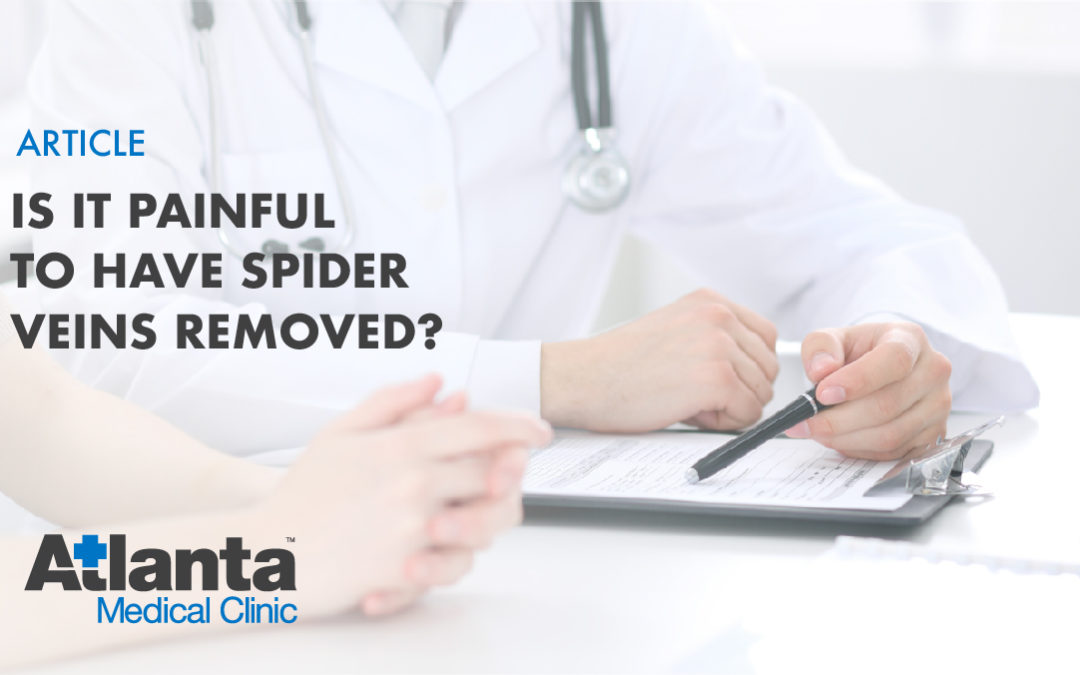While the small, damaged capillaries called spider veins can show up on any skin surface at any age, you’re more likely to find them on adults over age 50, and typically on the face or legs. Spider veins are usually harmless and don’t cause any discomfort, but for some individuals, they contribute greatly to the appearance of aging, damaged skin, and can also lead to painful symptoms like swelling, cramping, or weakness. How are spider veins removed, and what can you expect?
What Causes Spider Veins?
Spider veins can be caused by a number of factors, including weakness in the blood vessels and also an excess of pressure in the veins.
- In the legs, spider veins or varicose veins can occur when the vein’s valves stop working correctly and allow reflux of the blood backward. Blood may begin to pool in the vein, and over time, it branches out to form the reddish or bluish cluster of veins under the skin.
- Increased pressure from being overweight or from swelling can also cause poor circulation of blood in the legs which damage vessels.
- Spider veins in the face can occur if there is increased pressure or sun damage, which can break the tiny blood vessels, causing them to burst and spread.
No Pain, No Vein
Many people are concerned about pain when it comes to treating spider veins, but advances in medical technology make it a relatively simple procedure that is minimally invasive and with minimal downtime. In most cases, spider veins don’t cause any pain or discomfort, but occasionally they can lead to sensations of pressure, aching, irritation, or become an indication of a more serious condition like venous insufficiency. Since spider veins are small and close to the skin’s surface, they are most easily treated by light-based treatments like that of a laser, which focuses a strong beam of light on the veins, causing them to clot and dry up. Only a healthcare professional will be able to determine which course of treatment will be the fastest and most effective. After most spider vein treatments, the webs of discolored, damaged vessels clear up within 6 weeks or so.
How Can You Prevent Spider Veins?
There are a number of methods to consider that can help prevent the formation of spider veins:
- Wear sunscreen to eliminate damage to the small vessels under the skin.
- Avoid very heated areas like saunas which can cause the skin in the face to flush.
- Avoid wearing very tight clothing around the midsection or legs, which can irritate the skin.
- Maintain a healthy weight to improve circulation and avoid swelling in the lower body.
- Don’t cross legs at the knees, which can put damaging pressure on the skin around the thighs.
- Consider compression socks and elevating the legs in the evenings to reduce swelling.
There’s No Time like Now to Seek Treatment
Have you noticed the appearance of spider veins on your legs? When it comes to fast and successful treatment of vein conditions, Atlanta Medical Clinic is the best provider of modern, non-surgical treatment options. Whether you’re considering the removal of spider veins for cosmetic reasons or to eliminate painful symptoms like swelling, weakness, itching or cramping, you can trust your care to our group of medical professionals. Call today to learn more about your options!


It made sense when you explained that varicose veins are caused when the valves don’t work correctly and let blood begin to pool. I think I might have varicose veins because I’ve been having pain and swelling in both of my legs for the last two or three weeks. Thanks for teaching me about the cause of varicose veins and helping me feel prepared to discuss my options for treatment.
Hi Eileen! We’re glad to hear that!
I found it interesting when you talked about spider veins and their medical treatment. Recently, my mom mentioned she’s tired of having to hide her spider veins all the time. My mom’s been dealing with vein issues for some years now, and I believe it’s time they get removed, so I’ll suggest it. Thanks for the information on spider veins removal and their pain-free procedure.
Hi Eli! If you live in Atlanta, we’d be happy to help! You can call us at 404-872-8837.